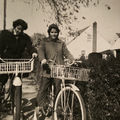
Orbiting Human Circus
Orbiting Human Circus is the continuing evolution of the imagination of Julian Koster (Neutral Milk Hotel, The Music Tapes, Elephant 6), whose music and storytelling under this moniker have encompassed immersive theater and a narrative fiction podcast released in partnership with Night Vale Presents and WNYC—with a new, epic musical fiction podcast coming soon—as well as more traditional EPs and singles. Quartet Plus Two is the group’s debut album.
The “Quartet” is composed of Koster, standup bass player Gauvain Gamon, drummer Kolja Gjoni, and pianist Benji Miller. The “Plus Two” are North and Romika, the singing saws, whom Koster encourages to sing. “I think saws sing like angels,” he says. “I always have, since I was a little boy. When you encourage them to sing, they do so earnestly and beautifully. It’s an honest and real sound. Sometimes when they are singing, I’ve even heard them speak, weep, and imitate birds.”
The origins of Quartet Plus Two are as magical and seemingly unlikely as everything else in Koster’s career. While walking through New York’s Central Park, he stumbled upon Gamon and Gjoni playing Gershwin and Mingus, and, with the addition of Miller, a musical partnership was born. Koster’s longtime collaborators Robbie Cucchiaro (horns) and Thomas Hughes (orchestral arranging and chimes) of The Music Tapes also contribute to the record.
The music they make together is at once familiar and unrecognizable; while exploring new musical paths ever forward, there is something as comforting as the smell of autumn leaves or snow. Alongside those composed by Koster, Orbiting Human Circus interpret compositions by Irving Berlin, Duke Jordan, George and Ira Gershwin, and others. The use of the term “composition” is intentional and speaks to Koster’s relationship with the music of Quartet Plus Two in far more evocative terms than “cover” or even “standard.” Much like passionate young pianists will sit down to play Brahms, or children can still be found the world over singing “London Bridge,” or the traditional “Koliada” featured on this album is still sung at holiday time, this music is vital, eternal, and right now—and through the medium of the hearts and souls of Koster and Orbiting Human Circus, the spark that animates these songs has never glowed more warmly.
The “Quartet” is composed of Koster, standup bass player Gauvain Gamon, drummer Kolja Gjoni, and pianist Benji Miller. The “Plus Two” are North and Romika, the singing saws, whom Koster encourages to sing. “I think saws sing like angels,” he says. “I always have, since I was a little boy. When you encourage them to sing, they do so earnestly and beautifully. It’s an honest and real sound. Sometimes when they are singing, I’ve even heard them speak, weep, and imitate birds.”
The origins of Quartet Plus Two are as magical and seemingly unlikely as everything else in Koster’s career. While walking through New York’s Central Park, he stumbled upon Gamon and Gjoni playing Gershwin and Mingus, and, with the addition of Miller, a musical partnership was born. Koster’s longtime collaborators Robbie Cucchiaro (horns) and Thomas Hughes (orchestral arranging and chimes) of The Music Tapes also contribute to the record.
The music they make together is at once familiar and unrecognizable; while exploring new musical paths ever forward, there is something as comforting as the smell of autumn leaves or snow. Alongside those composed by Koster, Orbiting Human Circus interpret compositions by Irving Berlin, Duke Jordan, George and Ira Gershwin, and others. The use of the term “composition” is intentional and speaks to Koster’s relationship with the music of Quartet Plus Two in far more evocative terms than “cover” or even “standard.” Much like passionate young pianists will sit down to play Brahms, or children can still be found the world over singing “London Bridge,” or the traditional “Koliada” featured on this album is still sung at holiday time, this music is vital, eternal, and right now—and through the medium of the hearts and souls of Koster and Orbiting Human Circus, the spark that animates these songs has never glowed more warmly.
Top tracks
Playlists
Similar artists
Albums
|
Quartet Plus Two
|
EPs
|
Saw's Tales (Quartet Version)
|
|
Into the River Thames (Vocal)
|
|
The Orbiting Human Circus
|
Singles
|
The Lost Angel
|
|
Laughs Last Laughed
|
|
Into the River Thames (Quartet Version)
|
|
The Sea of Tranquility
|
Featured in
|
Stepdream
|








